I’m so excited about today’s reviews. All of these books are well-written and either deeply entertaining or highly informative. Let’s dive right in!
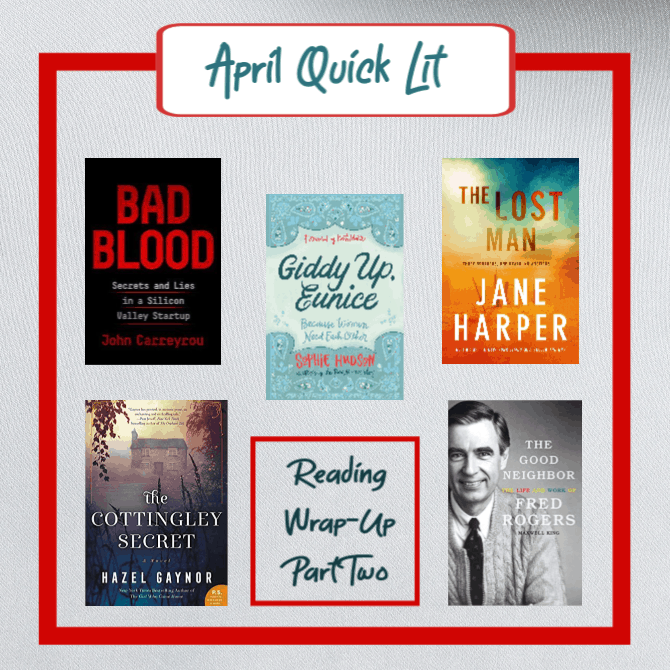
Bad Blood: Secrets and Lies in a Silicon Valley Startup, by John Carreyrou: This book has been popping up everywhere lately, and I can totally see why: the story is equal parts fascinating and terrifying!
Bad Blood follows the rapid rise and catastrophic collapse of Theranos, a multibillion dollar biotech startup that was founded in 2003 by then-19-year-old Elizabeth Holmes. Holmes was a college dropout who leveraged her family’s high profile connections to draw in investors for her product, a handheld device that could glean vital health information from just a few drops of blood obtained by a single finger prick. If it worked, it would completely revolutionize the medical industry. Holmes, who modeled herself after Steve Jobs with her artificially deepened voice and uniform of black turtlenecks, caught the attention of such investors as Larry Ellison, Henry Kissinger, and Rupert Murdoch. By 2014, the company was valued at nearly $10 billion and had partnered with Walgreens and Safeway to offer in-store blood tests at locations throughout the country.
Unfortunately, it was all too good to be true. Everyone with a medical background knew that there was no way a college dropout without a science degree could have invented such a product, and soon it became apparent that the Theranos devices were ineffective—leading to some frightening results for many users. Meanwhile, Holmes denied all allegations that her product was faulty. Theranos employees were held to strict confidentiality regarding “company secrets,” and those who refused to comply with Holmes’ dictatorial mandates were immediately fired (or worse). Through sheer ambition and hubris, Holmes kept the charade going for far longer than seems possible . . . until news of something “not quite right” landed in the hands of journalist John Carreyrou. The rest of the Theranos saga is Silicon Valley history.
This story shocked and amazed me. I found the character of Elizabeth Holmes especially fascinating, with her unique blend of charisma, chutzpah, and total disregard for the wellbeing of others. It’s hard to believe a company built upon a lie could gain so much steam, and garner so much attention; the story is an object lesson about the deceptive power of appearance, and the importance of always checking your facts. (It’s hopefully also a wake-up call to future Silicon Valley investors about the importance of industry regulation and a warning against the lures of corporate greed.)
While the Theranos story is clearly a riveting one, it might have seemed much less so in the hands of a less skilled journalist. Carreyrou maintians narrative drive from the first page of the last, incorporating enough facts to give us an understanding of the story without bogging us down with details. (Some of the names started to blend together after a while, but that’s largely because I listened to the audiobook; however, I found that even without having a firm grasp on the specific characters, I was still able to follow along with the story.) Carreyrou offers some intriguing insights as to how and why this scam succeeded, while also leaving quite a bit up to the reader’s interpretation. If I didn’t know better, I would assume this was a very realistic (if slightly improbably) John Grisham thriller, not a true story!
My Rating: 4 stars.
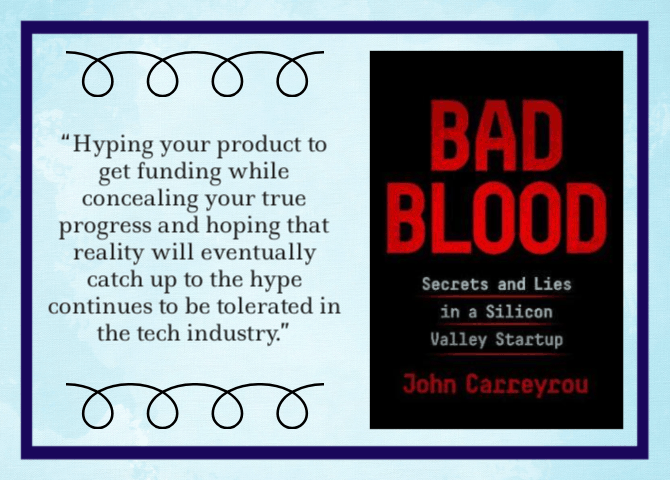
The Cottingley Secret, by Hazel Gaynor: In 1917, Frances Griffiths has just moved from Capetown to Yorkshire, where she and her mother will stay with family until her father returns home from the War. Frances desperately misses her father and her home, but is welcomed by her older cousin, Elsie, and—much to her amazement—by the fairies that dwell in the family’s lovely garden. When Elsie and Frances claim to have photographed the magical creatures, they are at first met with skepticism. But at a time when people are longing for something to believe in, the story of the girls and their fairies quickly captures the attention of the British people. Frances’ secret is no longer hers to tell, and for years she keeps the truth to herself.
One hundred years later, Olivia Kavanagh arrives in Ireland, desperate to escape her life in London and hoping to find answers in her late grandfather’s antiquarian bookstore. Olvia discovers an old manuscript from Frances Griffiths and becomes fascinated by the girl’s stories, and her possible connection to Olivia’s family.
This is a lovely book that breathes fresh life into the historical story of the Cottingley fairies. Frances and Olivia are both warm, inspiring protagonists and I enjoyed experiencing the magic of Cottingley through their eyes. While I found the historical elements intriguing, it was the modern-day story that touched me most deeply, and I was impressed by the author’s ability to weave the two stories—one fictional, one fact-based—into a single novel.
Gaynor’s writing is whimsical and literary, and her lyrical style is the true highlight of this book. Metaphors and colorful imagery come together to form an atmospheric novel glimmering with romance and light suspense. The Cottingley Secret is a gentle read that explores important themes of story, truth, hope, and redemption. Through their stories, Olivia and Frances teach us that sometimes imagination is more important than truth; that hope can be found within alternate realities; and that there is magic in following our hearts and pursuing our dreams.
My Rating: 4 Stars.
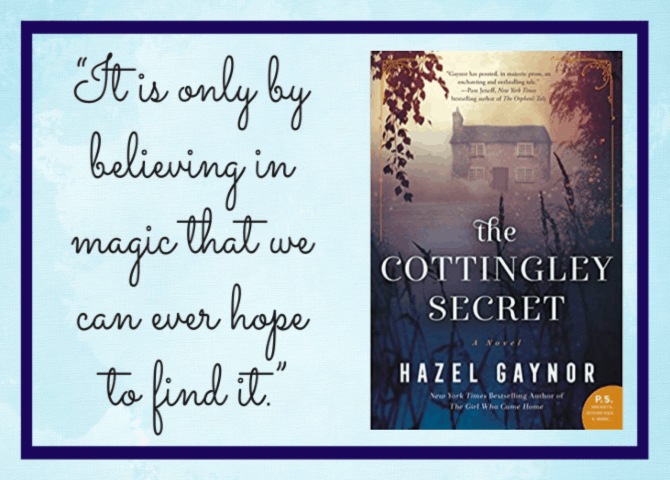
The Lost Man, by Jane Harper: Nathan Bright hasn’t seen his brother, Bub, for months, and their reunion in the remote Australian outback is not a happy one. Nathan and his teenaged son, Xander, have made the three-hour drive to his brothers’ adjacent property to celebrate Christmas, but the holiday is marred by tragedy when the body of their third brother, Cameron, is found at the base of a centuries-old grave marker. Nobody knows why Cameron was out on the property, alone, or why he died of exposure in the unrelenting sun with his fully functioning vehicle just yards away.
Nathan, Bub, and Xander return to Cameron’s ranch to grieve with Cameron’s widow and two daughters, as well as their mother and the ranch’s few employees. As they begin to investigate Cameron’s death, we flash back over Nathan’s forty difficult years in the Australian outback, from a traumatic childhood to a bitter divorce and, most recently, his depressing existence on his own remote ranch, far away from any human contact. We begin to see that none of the members in this family are as they seem, and wounds that have festered for far too long begin to take their toll. But what, if anything, do these past secrets have to do with Cameron’s death? How did he die, and more importantly, how will those he left behind be able to go on living?
Jane Harper is the master of the atmospheric novel. Her haunting depictions of the Australian outback are vivid, evocative, and terrifying, drawing the reader into both the setting and the story. I was both mesmerized and repulsed by the harsh realities of life for these Australian ranchers—a life I’d never imagined, but found fascinating. The characters are prickly but believable, and I warmed to them while remaining critical of their actions. Though the pieces of the story are slow to emerge, I flew threw this novel to uncover the mystery and was richly rewarded with an exquisitely pieced-together puzzle.
This is a captivating tale in an unforgettable setting, but Harper goes beyond plot twists and imagery to explore some challenging themes including domestic abuse, rape, and vigilante justice. These harsher topics are neither graphic nor gratuitous, and they serve to paint a painful but complete picture of a hurting family plagued by generational disfunction. Thankfully, we see glimpses of hope and redemption within this story, and I would love to see more in a sequel. The Lost Man is very different from Jane Harper’s first two novels, but so far it’s my favorite from her.
My Rating: 4.5 Stars.
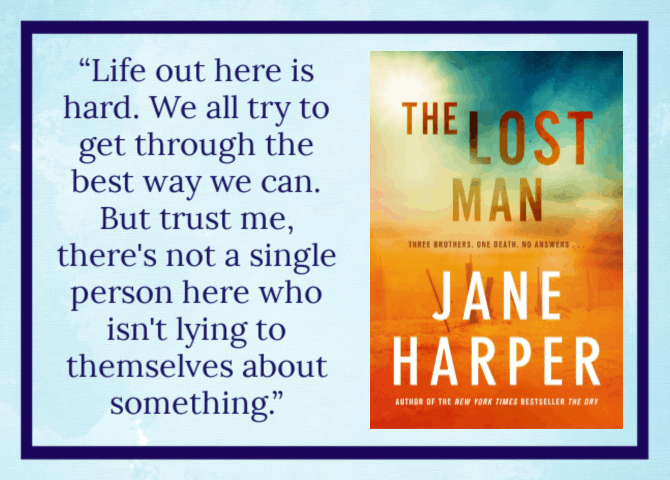
Giddy Up, Eunice: Because Women Need Each Other, by Sophie Hudson: If you’re not familiar with Sophie Hudson, you really should be. She’s southern, spunky, and sassy, and filled with wisdom and humor. I’m a big fan of the podcast she does with Melanie Shankle, where I’ve grown to love her unfiltered commentary and her enthusiasm for both the Gospel AND a decent southern meal, and I appreciate the unique perspective Sophie brings to the female Christian teaching circles.
In Giddy Up, Eunice, Sophie discusses the importance of female relationships, especially cross-generational ones. Framed around the Biblical stories of Elizabeth & Mary, Ruth & Naomi, and Lois & Eunice (yes, those last two are really in the Bible!), Sophie explores the qualities of intergenerational female friendships and shows that they are not only beneficial, but necessary for Christian women. Sophie adds color and warmth to her teaching through personal stories about her own female friendships. I loved seeing Sophie’s heart for this topic, and how she is living it out herself.
Sophie’s fantastic southern wit, hilarious rabbit trails, and quirky pop cultural references make this book ridiculously entertaining, but it goes beyond being a “fun read” to impart some important truths. I appreciated Sophie’s emphasis that female relationships don’t need to take the form of official, long-term mentorship to be beneficial, and her reminder that many of these “friendships” can exist with family members. I want to get a copy of this book into the hands of nearly every woman I know!
My Rating: 4.5 Stars.
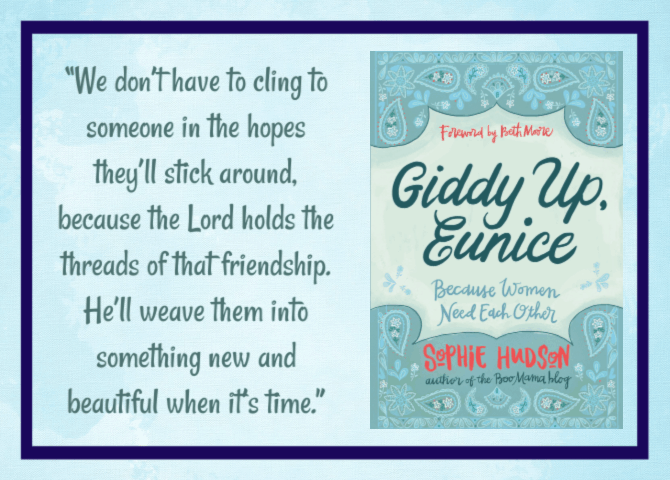
The Good Neighbor: The Life and Work of Fred Rogers, by Maxwell King: I can think of few modern-day individuals who are more beloved than Fred Rogers. Children, adults, Liberals, Conservatives, Christians, atheists . . . everyone knows Mister Rogers and, having grown up with his kindly songs and reassuring stories streaming from our television sets, most of us came to view him as a close and trusted friend. In The Good Neighbor, Maxwell King removes some of the mystique surrounding this iconic figure to create an intimate portrait of this compassionate, innovative, and deeply kind educator and television pioneer.
The Good Neighbor offers a comprehensive look at the life and work of Fred Rogers. King dives deep into Rogers’ family history and his childhood, showing how the quiet, overweight, lonely young child from an aristocratic family was transformed by circumstances and his parents’ unconditional love. Young Rogers was passionate about music, children, inclusivity, and early education, and these joint passions led to a lifelong career in educational programming (despite the fact that he was largely anti-television). King spends a majority of the book discussing Fred Rogers’ work on Mister Rogers’ Neighborhood, and I was intrigued and inspired by the intentionality Rogers brought to each and every episode. Rogers was a perfectionist who refused to compromise on his values (namely, the acknowledgment of the intrinsic value of each child, and a fervent desire to guide children through ideas and circumstances that might be frightening or confusing). Fred Rogers’ exacting standards sometimes made him difficult to work with, yet all who knew him respected his integrity and commitment to his life’s calling of serving children.
The Good Neighbor confirmed what I had hardly dared to believe: that Fred Rogers was every bit as wonderful off camera as he appears on his show. There were aspects of his character that surprised and delighted me: Mister Rogers was quick-witted and occasionally crude. His views on children and education were progressive, even radical, and he was not afraid to be culturally subversive. He was also a man of incredible faith—he was an ordained Presbyterian minister who prayed and read the Bible daily, but also studied the tenets of other faiths such as Catholicism, Judaism, and Buddhism. Mister Rogers’ perfectionistic nature and deeply held beliefs permeated every aspect of his life, from his work in television, to his diet and exercise habits, to his approach to vacations and family time. As an Enneagram 1, I enjoyed seeing how a fellow Perfectionist used these aspects of his personality for good.
I came away from this book with a much deeper understanding and appreciation for a man I had already admired. My only qualm with the book was the lack of information about Rogers’ marriage and relationship with his sons. This aspect of his life is touched upon, but I would have liked more, and given the amount of time King spends on Rogers’ early life, the omission is glaring. Still, I loved spending time with one of my childhood heroes through the interviews and stories shared in this book. I listened to the audiobook, which is fantastically narrated by LeVar Burton—another important figure from my childhood!
My Rating: 4 Stars.
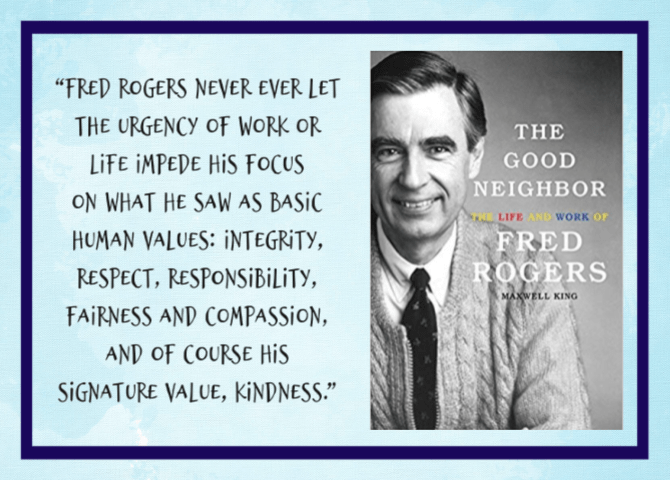
Have you read any of these titles? I’d love to hear your thoughts!
I’m linking up with Modern Mrs. Darcy to share what we’ve been reading lately. If you’re here from the linkup, check out Part One of this month’s book reviews right here.
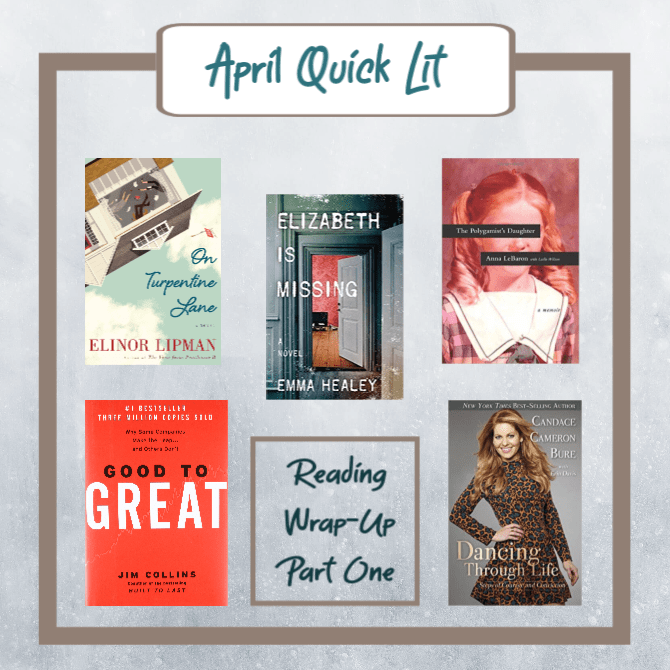
And come back next week, when I’ll be sharing reviews of two thrillers, an interesting memoir, and two compelling Christian living titles.